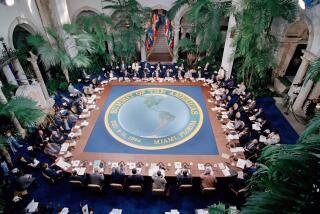On Behalf of Annual Summits
- Share via
President Reagan, who will meet Soviet leader Mikhail S. Gorbachev on Tuesday in Geneva, has said that he will propose that such summit gatherings be held annually. The roller-coaster ride of up-down-up public expectations during the past few weeks is dramatic evidence of why annual summits would be a good idea.
U.S.-Soviet summit meetings have been held 14 times in the last 42 years, which is long enough for us to know that, while such face-to-face encounters are worthwhile, their sporadic timing itself creates problems.
One of the best things about summit meetings is that they force leaders of the two countries to concentrate their attention on the issues that divide them. This is no small matter when you consider that both the American and the Soviet political systems are dominated by domestic concerns, and that neither Reagan nor Gorbachev normally has much time to think much about U.S.-Soviet relations and the arcane complexities of arms control.
At the same time, pre-summit concentration on the issues by the man on top can force the bureaucracies on each side to reexamine existing policy--something that they are normally reluctant to do--and produce alternative ideas for presidential consideration.
Experience suggests that summits succeed best when careful negotiations have already created the basis for agreement. Where the two sides are still far apart, as appears to be the case this week, there is a danger of an angry blowup by one side or the other, leaving relations in a more dangerous state than before.
However, there is something to be said for holding summits even when the prospects for concrete accomplishment are dim. In the first place, a fearful world demands it. Beyond that, the chance of a fundamental misunderstanding as to the other side’s purpose and determination can be diminished by a face-to-face meeting.
Unfortunately, it is extremely difficult to avoid the buildup of exaggerated, unrealistic expectations when summits are special occasions. When the results turn out to be modest, there is a tendency to judge the summit a failure--and the backlash of public disappointment makes the rational management of U.S.-Soviet relations that much more difficult.
Regular, preferably annual summits would help. The governments would be able to concentrate more on serious business and less on the show-biz, propaganda maneuvering for advantage. If the great powers could get into the habit of holding regular summits whether the political weather was fair or foul, the problem of excessive expectations would be diminished--and with it the dangers associated with summits that are perceived as unsuccessful.
More to Read
Sign up for Essential California
The most important California stories and recommendations in your inbox every morning.
You may occasionally receive promotional content from the Los Angeles Times.













